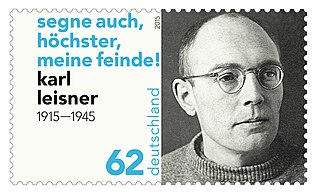
Karl Leisner was a Roman Catholic priest interned in the Dachau concentration camp. He died of tuberculosis shortly after being liberated by the Allied forces. He has been declared a martyr and was beatified by Pope John Paul II on 23 June 1996.
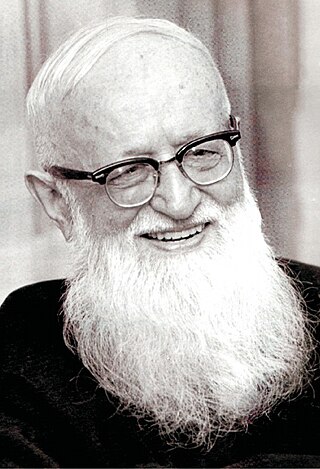
Peter Joseph Kentenich, SAC was a German Pallottine priest and founder of the Schoenstatt Apostolic Movement. Kentenich was a theologian, educator, and founder of a Catholic movement, whose teachings underwent a series of challenges from political and ecclesiastical powers. The process for his beatification was opened in 1975.
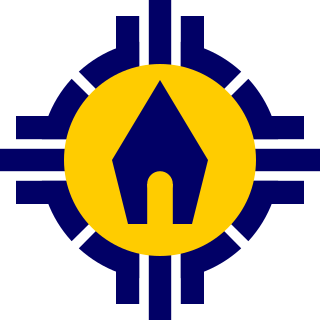
The Apostolic Movement of Schoenstatt is a Catholic Marian movement founded in Germany in 1914 by Fr Joseph Kentenich, who saw the movement as a means of spiritual renewal for the Catholic Church. The movement is named after the small locality of Schönstatt which is part of the town of Vallendar near Koblenz, in Germany.

Francisco Javier Errázuriz Ossa is a Chilean prelate of the Catholic Church who served as Archbishop of Santiago from 1998 to 2010. He has been a cardinal since 2001 and was a member of Pope Francis' Council of Cardinal Advisers from its creation in 2013 until his departure in 2018.

The Pallottines, officially named the Society of the Catholic Apostolate, abbreviated SAC, is a Society of Apostolic Life of Pontifical Right for men in the Roman Catholic Church, founded in 1835 by the Roman Catholic priest Saint Vincent Pallotti. Pallottines are part of the Union of Catholic Apostolate and are present in 45 countries on six continents. The Pallottines administer one of the largest churches in the world, the Basilica of Our Lady of Peace of Yamoussoukro in Côte d'Ivoire.

Vallendar is a town in the district Mayen-Koblenz, in Rhineland-Palatinate, Germany. It is situated on the right bank of the Rhine, approx. 4 km north-east of Koblenz. Vallendar is the seat of the Verbandsgemeinde Vallendar.

Catholic Marian movements and societies have developed from the veneration of the Blessed Virgin Mary by members of the Catholic Church. These societies form part of the fabric of Mariology in the Catholic Church. Popular membership in Marian organizations grew significantly in the 20th century, as apparitions such as Our Lady of Fátima gave rise to societies with millions of members, and today many Marian societies exist around the world. This article reviews the major Marian movements and organizations.

The Schoenstatt Shrine is a Catholic shrine which hosts the headquarters of the Apostolic movement founded in 1914 by Josef Kentenich in Vallendar, Rhineland-Palatinate, Germany.

Instituto Regional Federico Errázuriz, also known as President Errázuriz Regional Institute or I.R.F.E., is a primary and secondary school in Santa Cruz, O'Higgins Region, Chile.
Francisco José Cox Huneeus was a native of Chile and a former archbishop of the Catholic Church. He was a member of the Schoenstatt Movement. He was Bishop of Chillán from 1975 to 1981 and Coadjutor Archbishop of La Serena from 1985 to 1990 and Archbishop there from 1990 to 1997, when he resigned following accusations that he had sexually abused young boys. He was laïcized in 2018.

Haughhead is a hamlet two miles from Lennoxtown in East Dunbartonshire, Scotland. It was historically part of Stirlingshire until 1975, when it became part of Strathclyde along with many other towns and villages.

Franz Reinisch, SAC was an Austrian Catholic priest of the Society of the Catholic Apostolate who refused to take the so-called Hitler oath, for which he was executed.
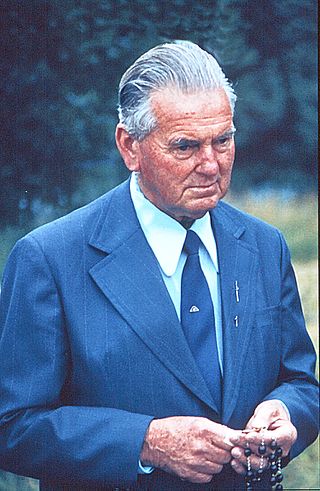
John Pozzobon was a Catholic permanent deacon and the starter of the Schoenstatt's Pilgrim Mother Campaign, today present in more than 100 countries in the world. His beatification process is ongoing.

The Pilgrim Mother Campaign, also known as the Schoenstatt Rosary Campaign, is an apostolic work founded by the Servant of God John Pozzobon and coordinated by the Schoenstatt Movement, counting presently more than 30 million members in over one million groups spanning 120 nations of the world.
The Sisters of Mercy of Verona is a religious institute of pontifical right whose members profess public vows of chastity, poverty, and obedience and follow the evangelical way of life in common.
Alexandre Awi Mello ISch, is a Brazilian Catholic priest, a member of the Secular Institute of Schoenstatt Fathers and the secretary of the Dicastery for Laity, Family and Life since his appointment by Pope Francis on 31 May 2017. He was previously national director of the Schoenstatt Movement in Brazil.
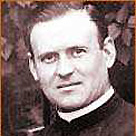
Richard Henkes was a German Roman Catholic priest of the Society of the Catholic Apostolate (Pallottines). Henkes served as a teacher but was best known for his preaching abilities in the pulpit where he made strong-worded condemnations of Nazism and the actions the Nazis were said to have made. Henkes offered indirect assistance to the German Resistance during World War II and was one of the more vocal German priests to condemn Nazism. This often worried his superiors who believed that Henkes placed his schools at great risk. He was critical of the regime's murder of the disabled and other atrocities which forced the S.S. to arrest him. His first arrest in 1938 saw him released but his second arrest in 1943 saw him sent to the Dachau concentration camp. It was during that time that he befriended Josef Beran who taught him the Czech language.
The Missionaries of Christ Jesus are a Catholic religious institute founded in Javier, Spain in 1944 by María Camino Sanz Orrio. Members use the post-nominal letters MCJ.
The Vinzenz Pallotti University is a Roman Catholic private university in Vallendar, Germany, that originated as a religious university of the Pallottines. It is run as an ecclesiastically and state-recognized academic university under independent sponsorship.















